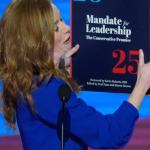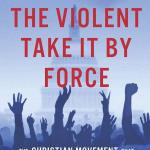Tribulation Force, pp. 403-404
The Grand Opening and ribbon-cutting ceremony for the rebuilt temple in Jerusalem gets disrupted by “Moishe and Eli” — Tim LaHaye’s interpretation of the Two Witnesses from the book of Revelation.
“Your blood sacrifices shall turn to water, and your water-drawing to blood!” Moses tells the Jewish faithful gathered there. Thousands of years later, Moses returns and still all he does is scold the people of Israel. You’d think he’d remember that losing his temper with them was why he hadn’t been allowed to go with them into the Promised Land in the first place, and …
Hey, that’s right. Moses is in Jerusalem. Maybe it wouldn’t be a big deal for Elijah to return to Israel after thousands of years, but for “Moishe” this should be huge. He’s never been there before.
“You shall not bring this assembly into the land that I have given them,” God told him (in Numbers 20), yet here he is. He wandered in the desert for 40 years striving and hoping to reach this place, but his life’s great aspiration was denied him. Until now. You’d think he’d want to look around a little more, check the place out a bit.
Jerry Jenkins switches back to Buck’s POV to tell us what happened after Moses said that business about water and blood:
Buck had been there that day as the new publisher of the renamed Global Community Weekly. He resisted Carpathia’s urging him to editorialize about what Nicolae called the intrusion of the two witnesses, and he persuaded the Global Community potentate that the coverage could not ignore the facts. The blood let from a sacrificed heifer had indeed turned to water. And the water drawn in another ceremony turned to blood in the pail.
I’m pretty well-versed in the arcane mythology of the Darbyverse, but I can’t figure out what this bit is about. The passage in Revelation about the Two Witnesses says that “they have authority over the waters to turn them into blood,” and I suppose that implies they could also turn blood into water. Yet despite all of this water-into-blood, blood-into-water business sounding very Bible-ish, I can’t find any supposed “prophecy” that suggests the Two Witnesses would be mucking about with the dedication of the temple like this.
This seems just to be something the authors made up — some gratuitous piece of additional “Moses vs. The Jews” action that can’t be made to fit into the larger story.
The whole point of rebuilding the temple, remember, is so that Nicolae Carpathia can later defile it and then destroy it again. This is it’s only purpose in LaHaye’s “prophetic” scheme. But Nicolae can’t very well defile a temple that hasn’t been properly consecrated in the first place. If the water for the necessary purifications is turned to blood and the blood for the necessary sacrifices is turned to water then the supposedly prophesied desecration — the desolation that is supposed to be awaiting Nicolae’s pig-fisting abomination — can’t occur. No consecration, no desecration.
By straying from the script, Moses and the authors may have just derailed the whole End Times process. I don’t know precisely what it means if one of the items on LaHaye’s prophetic check list is prevented from happening, but it’s probably not the end of the world (which, in this case, would mean it’s a major problem).
Buck hated the money he was making. Not even an outrageous salary could make his life easier. He had been forced to move back to New York. Much of the old guard at Global Weekly had been fired, including Stanton Bailey and Marge Potter, and even Jim Borland. …
I can’t really say that I can relate to Buck’s lament here, but there would seem to be at least two simple and obvious solutions to the problem of all that hateful money from his outrageous salary: He could give it all away, or he could quit his job.
Either way: Problem solved. Those who learn to give away their money well don’t usually find it hateful. The Gates Foundation, for example, has worked very hard to figure out what money can and can’t do when well-given, and this knowledge has made them appreciate the value of that money more than any miser ever could.
We’ll get back to that money in a moment, but first let’s just consider Buck’s new job. He’s the “publisher” now. That’s an exclusively managerial position and Buck has no management experience. His value to Global Weekly was as a reporter — as the Greatest Investigative Reporter of All Time. So by promoting him to the role of publisher, the magazine loses its star reporter and gains an untested, newbie manager with no taste for the work he’s now required to do. This makes no sense. It’s like if the Miami Heat were to announce that LeBron James has been promoted to CEO and general manager of the team and will no longer be out on the court in uniform.
But LaHaye and Jenkins can’t abide having their surrogate characters anywhere other than the very top of the pecking order. Keeping ace reporter Buck Williams as merely an ace reporter would mean he would also have to report to a boss — that someone else would still be calling the shots. That’s intolerable to the authors, so instead they have Buck get promoted to a job that he never should have been offered and never should have accepted.
He also never should have moved to Manhattan where, we’re told, he now lives in a “penthouse apartment on Fifth Avenue.”
Buck knows that the next big items on the End Times check list include famine and a “great earthquake” in which “every mountain and island is removed from its place.” Yet he moves to an island. Buck works for the first horseman of the apocalypse, so he knows that the third rider is coming soon, the rider on a black horse who holds a pair of scales and says, “A quart of wheat for a day’s pay, and three quarts of barley for a day’s pay.” Maybe Manhattan, which grows none of its own food and is connected to the rest of the world only by a handful of tunnels and bridges, isn’t the ideal place to be when that rider arrives.
Here again we see the members of the Tribulation Force ignoring the warning of the mini-apocalypse in Matthew’s Gospel:
Flee to the mountains; someone on the housetop must not go down to take what is in the house; someone in the field must not turn back to get a coat. …
If you claim to take that passage “literally” — insisting that it refers to the future events that Buck is living through in this novel rather than to, say, the destruction of Jerusalem in 70 CE — then downtown Manhattan is one of the last places you should be living. Any idea how long it would take to flee to the mountains from the penthouse of a Fifth Avenue apartment building? Several hours, at best — and even then you’re only talking about the Catskills, which might not be the best mountains to be fleeing to if you’re trying to escape “great suffering, such as has not been from the beginning of the world.”
The only positive factor about Buck’s new position was that he now had the means to isolate himself somewhat against the terrible crime wave that had broken all records in North America.
Here, yet again, the record-breaking crime wave is asserted, but not shown. I guess Buck’s money not only enables him to isolate himself from this crime wave, but it also isolates Jenkins from having to write about it or have it in any way influence the story or the lives of the characters we’re following.
It’s a telling detail, though, that the authors regard this — the ability to “isolate” oneself — as one of the “positive factors” about wealth. Just like Dives was able to isolate himself from that filthy criminal out there at his gate.
Buck hates his job and he hates his massive income. So why not just quit?
That’s not an option for most people reading the book, or for most people reading this blog, but it is an option for Buck. He doesn’t need to worry about finding another job. He can simply retire.
The fact that he’s only 31 years old doesn’t matter. He’s got enough money to live on for at least another six years and he already knows that he doesn’t have another six years. No one does. God is going to destroy the entire universe in five and a half years. So Buck doesn’t have to worry about outliving his savings, and he doesn’t have to factor in any concern for his heirs — none of them will live longer than another 66 months either.
That 66-month figure actually overstates the case, because his circumscribed life-expectancy isn’t the main factor here in calculating how long his money has to last. The more important deadline, fast-approaching in the faint hoofbeats of that black rider, is the point at which money itself becomes useless. Once the third rider arrives, all that hateful money won’t matter anymore. That’s when, in Larry Norman’s paraphrase (regarded as canonical by most premillennial dispensationalists), “a piece of bread could buy a bag of gold.”
Given that, cash isn’t what Buck needs to be stockpiling. He should be stocking away canned goods, imperishable foods, bottled water, medical supplies and apocalypse-strength sunblock. The need for such things is about to become massive and urgent.
Buck has a brief window of opportunity here, a very short span during which hateful money can still be exchanged for such necessities. With the advantage of perfect prophetic foresight and certain knowledge of what is to come, Buck ought to move someplace cheaper and milk his “outrageous salary” for all the cash he can get. While he’s at it, he should also be using that salary to apply for and max-out every credit card and consumer loan he can qualify for. And just as quickly as all that money is coming in he ought to be spending it back out on supplies in preparation for the calamities to come. Some of that money should also go to the stealthy acquisition of several off-the-grid locations to serve as eventual refuges, hiding spots and caches for all the supplies he’s gathering.
We’re about to hit a passage in which Jenkins lionizes right-wing militia groups as the sole source of resistance to Nicolae’s OWG takeover. The authors admire those groups for their paranoia/vigilance against the threat of just such a one-world government, but they fail to notice what would likely be their more valuable contribution during the Great Tribulation that LaHaye foresees: they’re survivalists. That’s what Buck needs to become too in this story.
Here in the real world, I’d much rather be hanging out at some swanky Manhattan apartment than to be stuck in the mountains of Idaho with some bearded fanatic in camouflage who thinks Glenn Beck isn’t paranoid enough. But put me in this story, in the dystopian nightmare of Tim LaHaye’s “prophetic” fantasies, and I’m headed for Idaho.
















